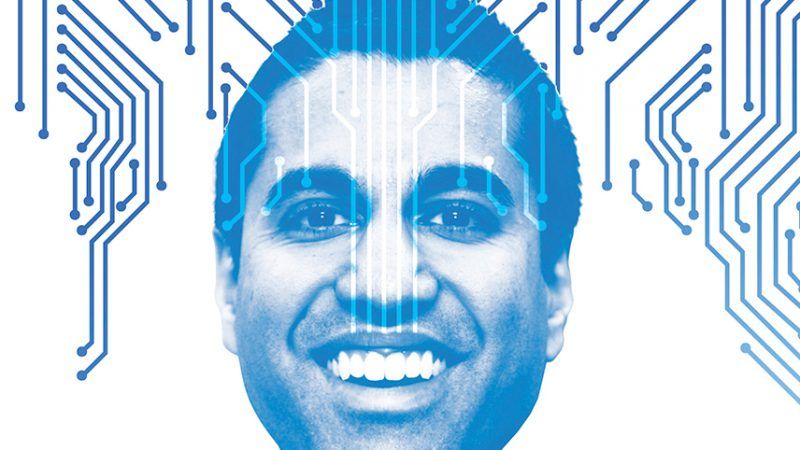The FCC Takes Its Hands Off the Internet

In April, Ajit Pai, the newly appointed chairman of the Federal Communications Commission (FCC), announced his first major initiative: taking internet regulation back to 2014.
Two years earlier, the FCC had reclassified how the web is treated under the Telecommunications Act. Before, it had been a Title I information service, which is lightly regulated. Now it was a Title II telecommunications service, essentially a utility, like the landline phone system.
President Barack Obama had pushed aggressively for the change—part of a policy known as "net neutrality"—raising questions about the agency's independence from the executive branch. The new rules were put in place under a cloud of secrecy, with the specifics hidden from public view until after they were voted into effect.
Previous iterations of the FCC's net neutrality rules had been struck down by the courts, which said the agency did not have sufficient authority to mandate that internet service providers (ISPs) treat all online content equally. Reclassifying the web under Title II gave the commission the regulatory muscle to make net neutrality a requirement.
In his April remarks, Pai declared that the switch had been a costly error, noting that capital expenditures on domestic broadband among the country's largest providers had decreased by about $3.6 billion since the reclassification—the first time that such investments had ever gone down. As part of the increase in regulatory oversight associated with reclassification, the FCC had adopted a vague but sweeping "general conduct" standard that gave it the power to crack down on perceived bad behavior by internet providers without providing clear guidance about what would trigger enforcement.
Pointing to a Clinton-era decision to minimize internet regulations, Pai called the resulting decades of innovation "the greatest free market success story in history." His goal as chairman would be to return the web to the pre–net neutrality state in which it had thrived for so long.
In November, after a period of public comment, Pai called a vote on whether to rescind the Obama-era rules. "Under my proposal, the federal government will stop micromanaging the internet," he said. The commission's current makeup meant the change was virtually certain to pass.
Pai's proposal is the culmination of more than a decade of bureaucratic squabbles that began during George W. Bush's presidency. In 2005, the FCC adopted a set of "policy statements," or general principles, for how the web should be regulated. Internet users, the agency said, were entitled to access the content and applications of their choice, to connect devices to the internet as they saw fit, and to enjoy competition among service providers. But these were guidelines, not rules. When the FCC in 2008 went after Comcast for throttling internet speeds for heavy BitTorrent users, a judge ruled the agency out of line.
Obama's first FCC chairman, Julius Genachowski, oversaw the passage of a set of net neutrality regulations, but these too were struck down. In 2014, a court ruled that the agency did not have the statutory authority to force Title I companies to behave in certain ways.
In response, Obama's second FCC commissioner, Tom Wheeler, pushed through the switch to Title II. Even many net neutrality supporters agreed the change gave the agency too much power over the net—including even the right to regulate prices. The FCC agreed, at least temporarily, not to use all of the authority it now had to dictate operations to service providers. But it also said it would revisit those decisions in the future.
Pai's new rules make that reassessment unnecessary, but they don't leave the internet entirely without supervision. Under his order, the FCC will require ISPs to be transparent about their network management practices, and the Federal Trade Commission will maintain the ability to regulate them for privacy and anti-competitiveness. Congress, of course, can always pass laws requiring additional forms of oversight.
Contrary to the claims made by some of Pai's critics, the internet will not suddenly be unregulated in a new and dangerous way. Instead, it will be governed more or less as it was in the beginning, from the early days of message boards and Angelfire home pages through the development of Facebook and YouTube and the birth of the mobile web. It will be the internet as it was through 2014—in other words, the internet as we've (almost) always known it.
This article originally appeared in print under the headline "The FCC Takes Its Hands Off the Internet."


Show Comments (0)